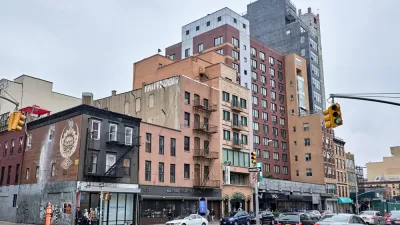The latest installment of Planetizen's "Ask the Ethicist" series features the advice of our resident expert: Carol D. Barrett, FAICP, author of "Everyday Ethics for Practicing Planners."

"Ask the Ethicist" allows planners to pose tough questions regarding ethical practices in planning to our resident expert: Carol D. Barrett, FAICP, author of Everyday Ethics for Practicing Planners.
Question: I'm a Planning Manager in a city that is currently short-handed—even routine projects are moving very slowly through the pipeline.
I recently got a phone call from a friend, "Karen," who is a well-known housing advocate in our community. Karen's organization, "New Starts," has just received a letter from an attorney telling them they have received an anonymous bequest of land (already entitled for multi-family development with an adopted Environmental Impact Report) and also $20 million toward construction costs for a new project, provided they can secure building permits within four months. They are seeking relief from development standards and a density bonus for affordable housing.
No one in the city knows anything about the bequest or even the project. I am pleased for Karen’s organization but find myself scratching my head. Given current resources, after the state mandated incomplete letter goes out a month after submittal, it would be a long time before I am able to complete all of my work, and it hardly seems likely, given that plan check in the Building Division itself takes six weeks, that the time frame can be met.
I am currently considering the following dilemma: How I maintain a fair and consistent process when lots of applicants are seeking expedited review while also fulfilling my responsibility to seek social justice?
Carol Barrett: Like many communities, your city probably has an adopted housing strategy that almost always includes language related to reducing barriers to the production of affordable housing. That responsibility exists in addition to the AICP Code language, which states:
f) We shall seek social justice by working to expand choice and opportunity for all persons, recognizing a special responsibility to plan for the needs of the disadvantaged and to promote racial and economic integration. We shall urge the alteration of policies, institutions, and decisions that oppose such needs.
Those are the first two good reasons why a response to Karen that explains how busy you are as a staff just won't cut it. So what happens next?
Your first responsibility (and this would be true for any applicant) is to run the calendar: Exactly how many days are needed for each step of the process to conform to your Municipal Code?
So if that's what you do, you might see that it's just barely possible, making a huge number of assumptions about everything proceeding smoothly. Your next step involves figuring out if it is possible to re-arrange the workload to take on the project and move it to the front of the line. Referring back to the adopted housing strategy should provide a policy framework. There are a number of options to consider:
- With $20 million at stake, New Starts should be willing and able to cover the cost of a temporary planner who will focus exclusively on their project.
- Are there projects moving through review that are not time sensitive where you could shift things around?
- Are staff members (and that includes you as the Planning Manager) willing to work on their own time or overtime to advance the project? (Make sure that this option doesn't run afoul of requirements of the Fair Labor Standards Act or provisions of any union agreements. You can't ask people to work for free/volunteer under certain provisions of union agreements or requirements for overtime.)
- Are there available funds for part-time temporary help in your budget?
Assuming that your calendar is right and that you can figure out staffing, this will also require a huge commitment on Karen's part to ensure the timely provision of materials that are correct when reviewed the first time.
Now it's time to review this issue with Karen. Who has she hired to prepare the application? Are they knowledgeable about city requirements? Karen needs to understand and accept her responsibility for setting the stage for a successful project review process.
Don't forget to bring your supervisor into the conversation. As you well know from experience, if things so south, Karen will undoubtedly push every button she can to force a top down approach to cooperation, such as complaints to the mayor and publicity about uncooperative staff. You've seen it all. Management needs to understand what's at stake and the efforts being made to ensure a good working relationship. In all likelihood, you were already working with your supervisor around the staffing resource constraints anyway.
Finally, one should always recall that housing advocates have a very close relationship to the state Department of Housing and Community Development. HCD would be very likely to formally inquire about the status of the implementation of your housing strategy if Karen contacted them with complaints about your city's unwillingness to move forward in response to her request. There’s no telling where such an inquiry might end up. It's better to keep it from even starting.
[Editor's note: If you have an ethical quandary for consideration, please email [email protected] and include "Ask the Ethicist" in the subject line. We will ensure anonymity of all parties. In the meantime, be sure to read the AICP Code of Ethics and Professional Conduct.]

Maui's Vacation Rental Debate Turns Ugly
Verbal attacks, misinformation campaigns and fistfights plague a high-stakes debate to convert thousands of vacation rentals into long-term housing.

Planetizen Federal Action Tracker
A weekly monitor of how Trump’s orders and actions are impacting planners and planning in America.

San Francisco Suspends Traffic Calming Amidst Record Deaths
Citing “a challenging fiscal landscape,” the city will cease the program on the heels of 42 traffic deaths, including 24 pedestrians.

Defunct Pittsburgh Power Plant to Become Residential Tower
A decommissioned steam heat plant will be redeveloped into almost 100 affordable housing units.

Trump Prompts Restructuring of Transportation Research Board in “Unprecedented Overreach”
The TRB has eliminated more than half of its committees including those focused on climate, equity, and cities.

Amtrak Rolls Out New Orleans to Alabama “Mardi Gras” Train
The new service will operate morning and evening departures between Mobile and New Orleans.
Urban Design for Planners 1: Software Tools
This six-course series explores essential urban design concepts using open source software and equips planners with the tools they need to participate fully in the urban design process.
Planning for Universal Design
Learn the tools for implementing Universal Design in planning regulations.
Heyer Gruel & Associates PA
JM Goldson LLC
Custer County Colorado
City of Camden Redevelopment Agency
City of Astoria
Transportation Research & Education Center (TREC) at Portland State University
Jefferson Parish Government
Camden Redevelopment Agency
City of Claremont






























